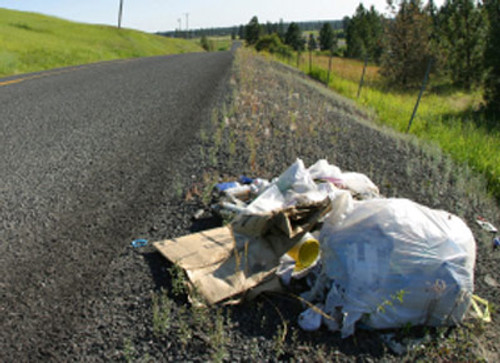Compostable Does Not Mean Naturally Biodegradable
Posted on Feb 1st 2021
Compostable Does Not Mean Naturally Biodegradable
Much has been written about the confusion between the terms “biodegradable” and “compostable.” Most articles on the subject highlight the issues with the word “BIODEGRADABLE” and how easily it can be used as a greenwashing tactic.
It is certainly true that many companies have (often unknowingly) abused the word “biodegradable” using it to give the illusion of compostability for a synthetic item. There is no time horizon for biodegradability and something can take several years to decompose and still be considered biodegradable (composting, on the other hand, requires 120 days in a lab, 90 days in most industrial composters).
However, we have seen that the opposite is also true: people sometimes fall into the trap of thinking that just because a material is labeled as compostable, it must also biodegrade in a natural environment.
When it comes to bioplastics, and a handful of other highly processed materials, this is not the case.
The vast majority of bioplastic packaging would not decompose quickly in any natural environment - lands or oceans. This is a bit by design. Bioplastic packaging has to stay strong and usable throughout its lifespan to actually serve its purpose. And even though bioplastic comes from a renewable resource, it is still a synthetic material, as raw inputs are chemically altered in order to become polymer chains that function like any other plastic. So even when a plastic is certified compostable, it likely won’t biodegrade if it becomes litter and would have the same negative impact on the oceans and lands as a standard plastic alternative.
Biodegradable versus Compostable: Differences in Action
- A large beam of untreated wood: Non compostable, but will biodegradable over the course of many years. Even though wood takes a long time to biodegrade, it comes directly from nature and is typically not a material that generates significant concern as litter.
- EcoProducts PLA cold cup: Industrially compostable, but not biodegradable in nature. These cups should not end up as litter. As litter or in a landfill, they will behave similarly to other plastics.
- Hemp Twine: Accepted at only a handful of composting facilities (hemp can take more than 90 days to decompose and has antimicrobial properties that may hinder the chemistry of composting) but readily biodegradable and are not a material we generally worry about if it were to end up as litter.
- Cardboard box: Compostable (though it should be recycled and not composted if it is clean) and readily biodegradable.
- Compostable Poly Mailer: Compostable (as long as it is either BPI Certified or CMA Certified) but unlikely to readily biodegradability. No compostable poly mailers currently on the market have passed marine biodegradability ASTM testing.
We believe that most companies are generally aligned with us that composting is not the ideal end of life scenario for ecommerce packaging. So, when companies ask us if something we offer is compostable, we recognize that in a lot of instances, their main concern is that they do not want their packaging to contribute to land and ocean plastic pollution, even if their packaging does end up as litter.
With this lens in mind, when asked about our compostable packaging, our answer focuses a lot more on natural biodegradability and impact on ocean pollution:
Our paper mailers and corrugated boxes are your best “compostable” choice. These options are compostable (though they should be recycled), naturally biodegradable, and in a natural or marine environment, have shown to decompose in less than two months. Our labels and stickers that are made with 100% recycled, uncoated paper as well as our non-reinforced water activated tape are naturally biodegradable and will not leave behind microplastics as litter. Packaging paper, GreenWrap, tissue and all of our other paper-based accessories are also naturally biodegradable.
While these options are naturally biodegradable, please encourage customers to dispose of them responsibly. In most cases, this means recycling.


